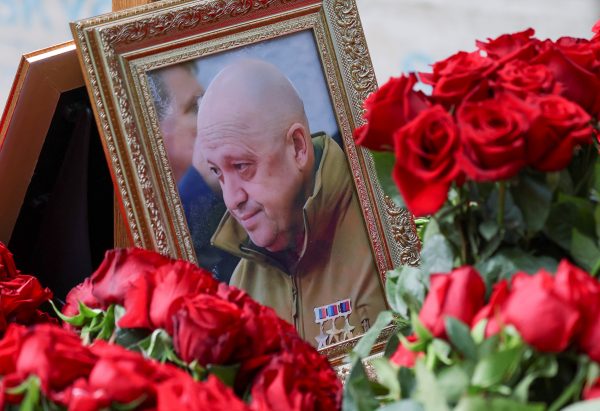On 23 June 2023, Prigozhin’s paramilitary group Wagner sought to dismiss the current Russian military leadership for alleged incompetence by marching with thousands of armed troops on Moscow. After stopping only a few hundred miles from the Russian capital, Prigozhin allowed the president of Belarus to talk him into ending the march and moving Wagner troops to Belarus.
Despite agreeing to stay in Belarus, Prigozhin returned to Russia and faced no legal consequences. But he was killed in an airplane crash two months to the day of his failed mutiny. Though it remains unclear whether the Kremlin was directly involved in this crash, a clear signal has been sent to anyone seeking to challenge Putin’s rule, especially those in his inner circle. While Prigozhin’s death should lessen the damage to Putin’s reputation, other consequences of the mutiny cannot be undone.
Wagner’s actions are deeply damaging to Putin for a host of reasons. Stable governments don’t allow hostile armed forces to march on their capital. Rulers who claim to be as popular as Putin shouldn’t need to issue orders for rank-and-file members of the military to stop an armed group’s march on Moscow.
The attempted mutiny and the amount of time elapsed before Wagner faced any consequences are both clear indications of Putin’s domestic weakness. The ongoing crackdown on dissent demonstrates the Russian government’s inability to return to a state where domestic consent is obtained through non-coercive means.
With domestic support for Putin weakening, Putin’s position in Asia is compromised in a way that has not been seen in his 23-year reign. The fallout is unlikely to realign the foreign policies of Russia’s Asian neighbours, but perceptions of Putin’s long-term reliability have plummeted, as has Russia’s leverage in any future negotiations.
A ruler struggling to maintain power at home — especially during a war — is unlikely to be taken seriously during foreign negotiations. This is true for Russia, whose relationships with key allies — China, North Korea and India — have come under strain.
China’s President Xi Jinping has invested substantial political capital in developing a close partnership with Putin and a Russia without Putin cannot be relied upon to continue its present foreign policy direction. The same is true for other Asian leaders — including North Korea’s Kim Jong-un and India’s Narendra Modi — who have spent years building a personal relationship with Putin. The future expansion of the Brazil, Russia, India, China and South Africa (BRICS) alliance depends on Russia’s ability to prioritise complex international negotiations instead of fixating on coup-proofing.
If Putin must use already scarce resources to buttress his domestic position after his ability to stay in power has been compromised, he’s unlikely to see deepening foreign relationships as a priority. More importantly for the leaders of China and North Korea, Putin — or a potential successor — might be too distracted by domestic unrest to aid Russia’s foreign partners at a time of need. Russia has already failed to deliver promised arms to India as a result of its war against Ukraine. The Chinese leadership must be concerned about Russia’s ability to play a major role in any potential dispute with the United States.
The failed mutiny also risks damaging Russia’s economic relationships with its Asian neighbours, particularly China. Trade between Russia and China reached US$190 billion in 2022 and the interdependence between the two countries’ economies has only deepened in 2023. This interdependence has already become one-sided due to China’s economic superiority. Russia will need to make additional concessions to maintain this relationship.
The quickest path for Putin to restore his popularity within Russia and bolster the confidence of its allies would be to boost the wages of government employees and increase other forms of government spending. Putin must also ensure the continued support of domestic elites, especially the leader of Chechnya. The assets of Western companies leaving Russia are likely to end up in the hands of pro-Putin oligarchs, despite their record of inefficiency and being a target of public ire. Increasing government spending and transferring productive assets to political allies during wartime all while facing plummeting oil and gas revenues risks pushing the Russian economy to the brink.
This has significant implications for China’s ability to recoup its Russian investments and to maintain its present level of imports. While it’s possible that Chinese firms might benefit from the nationalisation and privatisation of the West’s Russian subsidiaries, China might be better off steering clear of the process to avoid Western retaliation.
Wagner’s failed mutiny — together with setbacks in Russia’s war against Ukraine — hints at Russia’s inability to maintain its great power status. Russia is politically and militarily overstretched, its government enjoys only surface-level support from its people and the situation is unlikely to improve in the foreseeable future. As Russia’s domestic situation continues to deteriorate, countries counting on Russia’s full support in challenging US influence in Asia are losing confidence.
Gennady Rudkevich is an independent scholar. He previously taught political science at the University of Illinois and at Georgia College.

